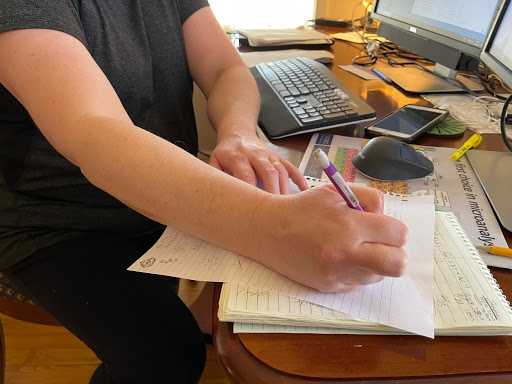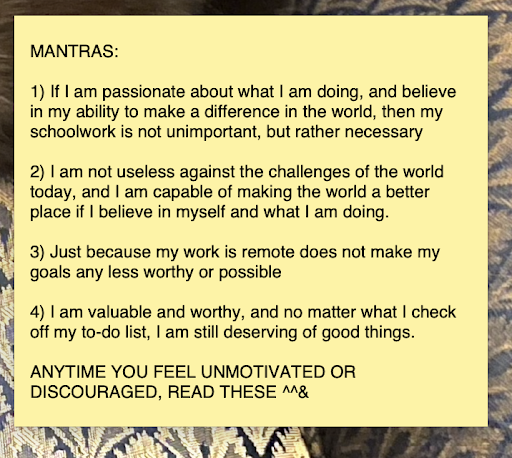Mental Health and Motivation in a Pandemic
By a UNC Peer Tutor
Throughout this past year, I have found that my optimism and overall motivation has decreased significantly, as school seems trivial compared to the profound challenges currently facing the world. My future seems bleak amidst the labor crisis surrounding employment opportunities as well as my inability to connect with others. I first noticed this shift in my mental health and mindset when completing a paper for a policy class. I found myself asking questions like, “Why is this little assignment even important when the world is facing such great challenges and hurting so much?” or “Will this paper even mean anything?” These largely negative existential questions made it difficult to write, but as I worked, I developed tactics to address these questions and the feelings behind them.
When facing this policy paper, I found that through using positive self-talk, reflecting, and keeping a note on my desktop, I was able to feel that my work meant something and stay positive while doing it. I knew that not putting my best foot forward on an assignment worth so much of my grade would end up making me feel worse, so I decided I could try my best even if my best wasn’t to my normal standards. I reminded myself that adjusting my standards did not make me less of a person or less of a student. From these reflections, I created four positive mantras, or statements, that I repeated any time I felt that my work wasn’t important or that I wanted to stop the writing process during the policy paper assignment:
- If I am passionate about what I am doing, and believe in my ability to make a difference in the world, then my schoolwork is not unimportant, but rather necessary.
- I am not useless against the challenges of the world today, and I am capable of making the world a better place if I believe in myself and what I am doing.
- Just because my work is remote does not make my goals any less worthy or possible.
- I am valuable and worthy, and no matter what I check off my to-do list, I am still deserving of good things.
Whenever I felt like my paper was not good enough or I had not reached the progress I felt like I should, my third and fourth mantras helped me to be kind to myself, re-evaluate my work in a more positive and less self-deprecating way, and keep going instead of giving up. When I was finished with my paper and felt that all my work may have meant nothing more than a numerical grade for a class, my first and second mantras pushed me to think in a different way and see the paper as having been a way to further research my interests in a field that I love instead of an assignment that was not valuable to me and my future. My four mantras kept me on track with the assignment and with my mental perception of my work and myself.
While writing my policy paper, I also started to realize that I needed to focus more on taking care of myself. I started taking walks outside everyday, spending more time relaxing and watching media I wanted to catch up on, and keeping a consistent schedule instead of sleeping and eating at random times. As I reexamined my habits, I slowly realized that creating wellness outside of school wasn’t cause for guilt. In fact, I felt most focused and ready to work on my paper when I felt satisfied in other areas of my life. Now, I have incorporated a series of lifestyle changes in my daily life, such as establishing consistent schedules of academic and personal work, taking things day-by-day, adopting new hobbies, and ensuring I spend adequate time talking to my friends and family.

For example, I now wake up at 9 AM everyday, eat breakfast at 9:30 AM, lunch at 12:30 PM, and dinner at 6:00 PM. I take a walk in the middle of the day while the sun is out, and I stop working after 8 PM. I make an active attempt to stay in the present instead of constantly fixating on the future. For example, if I have a homework assignment due, I try to see it as one assignment rather than 25% of my grade in a class that I need for a major that I need to do well in to get a job and “save the world.”
Now, if I feel alone and like my feelings are invalid, I can use self-care strategies and repeat my guiding mantras to help myself remember that these thoughts aren’t true. And on days when I need extra support, I’ve really benefited from investing time into finding resources to help navigate difficult feelings I had. Between time management worksheets, wellness pages on social media, and therapy, there were numerous resources that helped me regain my sense of self-worth and motivation. In the meantime, I will keep doing my best each day to stay safe and healthy.
This blog showcases the perspectives of UNC Chapel Hill community members learning and writing online. If you want to talk to a Writing and Learning Center coach about implementing strategies described in the blog, make an appointment with a writing coach, a peer tutor, or an academic coach today. Have an idea for a blog post about how you are learning and writing remotely? Contact us here.



